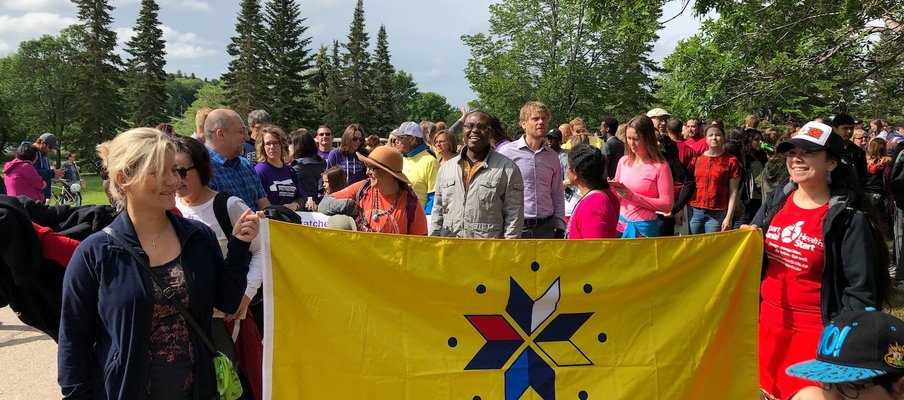
New Action Groups Focus on Reconciliation in Saskatoon
In this issue
 Engage - Volume 11, Issue 2, Spring 2021
Engage - Volume 11, Issue 2, Spring 2021
Reconciliation Saskatoon’s newly formed Action Groups bring together diverse voices to strategize on future steps for the ongoing work in addressing Reconciliation in the community. This new initiative, which builds off its previous project, Pathways Forward, will focus on key areas of newcomer relations, youth and families, business engagement and Two-Spirit identity.
“It was the evolution of our organization to continue towards tangible action,” explains Carrie Catherine, coordinator, Reconciliation Saskatoon.
Members of Reconciliation Saskatoon include nonprofit businesses, Saskatoon Police Service, public library workers and faith communities who are all committed to the ongoing work of Reconciliation. “Our members really informed this new endeavour, as well as getting input from Elders and residential school Survivors,” Catherine says. Through their consultation, the organization has narrowed down the focus to the identified Action Groups.
While the Action Groups are still in the early phases, around 70 members are spread out throughout the overall project. Catherine says members' work in each area continues to grow. “What I think is really exciting about these early stages is having such diverse voices sitting around a circle every month, talking about tough conversations and trying to identify where we can have an impact and where we can spark real change,” she says.
Some concrete goals in the next year include providing spaces where people can come together and grow. Catherine says an example of that has been identified in the newcomers’ group where Indigenous Awareness training will take place for fellow newcomers that will include Indigenous history and culture.
Additionally, members working in the Business Engagement Action Group hope to see more businesses commit to antiracism training and Indigenous Awareness training for their employees.
“Ideally, this will also result in equitable hiring and inclusion strategies while creating Indigenousspecific positions where people can succeed,” Catherine adds.
The pandemic has shifted the way the project will roll out, explains Catherine, but it hasn’t been entirely negative on its progression. “It has been quite easy for members to hop online and participate up until this point,” she says. “The challenges will come when we’re trying to build relationships. The change and inspiration that comes from being in a room together does not compare [to online meetings.]”
As far as larger community reach goes, Reconciliation Saskatoon has recently started a book club and talking circles that are open to community. The organization started noticing the need for a space for people to come together and ask honest questions while learning and growing together. While these conversations are less formal, Reconciliation Saskatoon continues to deliver antiracism training sessions to organizations and community groups. “This kind of training helps us have the proper foundation and an understanding of necessary terms so that we know how to be good allies in this work,” Catherine says. “I am such a huge dvocate for this kind of training, as it gives confidence to people to move forward and not take a back seat when it comes to racism.”
As the Action Groups solidify their working foundation for the year ahead, Catherine says Reconciliation Saskatoon continues to find ways to engage youth. “As the youth component continues to build, I am confident that young people will create necessary connections and have their voices heard in the ongoing work of Reconciliation.”
This project received support through SaskCulture’s Multicultural Initiatives Fund, funded by Sask Lotteries.

